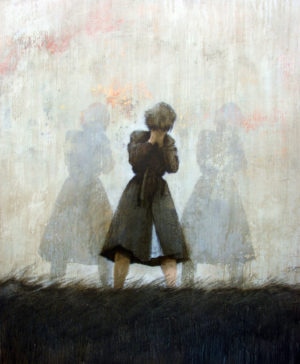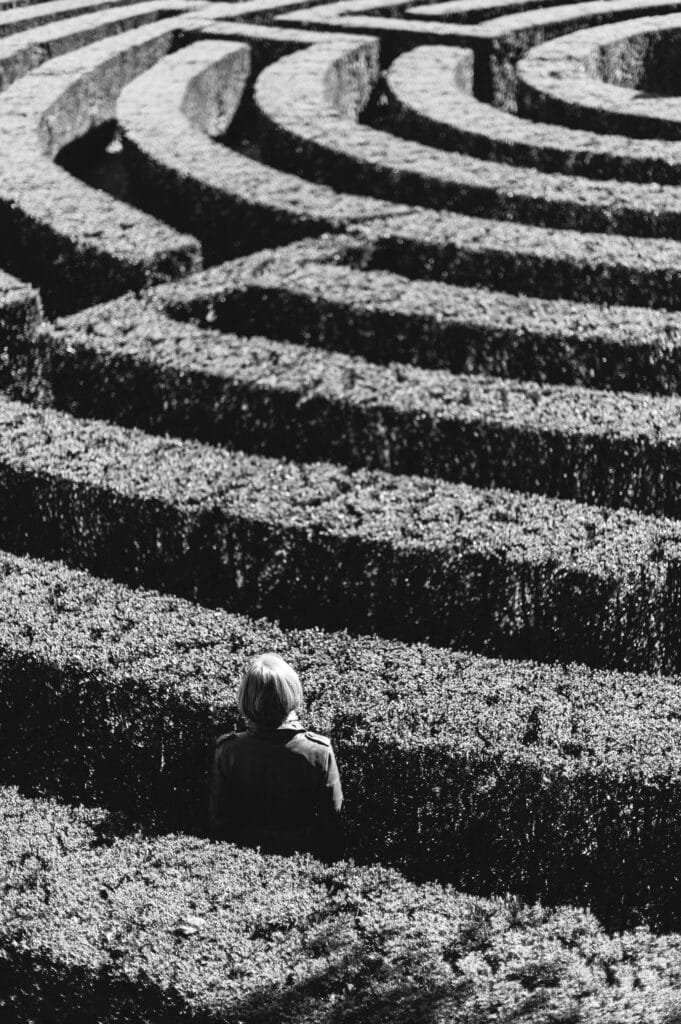Releasing the Need to Struggle

One of my biggest turning points came in the form of exhaustion. I found myself repeatedly exhausted, not the everyday exhaustion that comes from being busy or frazzled. It was a kind of existential exhaustion that seemed to permeate every cell of my physical and emotional being.
I realized I was exhausted because my underlying approach to life had been primarily formed by the energies of striving and struggle. Struggle, meaning the expectation that things would be difficult, the assumption that I was always behind, that I would have to brace myself for inevitable losses, and that I must labor tirelessly for what I desired. Although the impulse to strive was always cloaked in optimism and enthusiasm, I realized this approach to life was burning me out. I reflected on how striving and struggle had helped me achieve so much, however, it was no longer serving me the way it once did. I was against a wall, I saw that my life-force had been muscled into striving and I could not continue that way anymore. My body was telling me to stop.
I reached a point where I had basically achieved much of what I wanted in life, but I still felt this impulse to keep striving from a place of lack and a belief that I needed something else to complete me. It was like a motor running. I realized this motor of struggle had been running my whole life. I had an interesting realization: struggle and striving felt good to me, this mode of struggle felt normal and very safe. What felt odd and uncomfortable was to NOT strive, but to simply BE.
This led me on a journey to discover much about what was going on underneath the impulse to struggle.
Ultimately, I realized that struggle was, for me, an over-compensation based on a traumatic belief in some fatal inner deficiency. It often manifested as a low-level sense of background shame and a feeling of “never being good enough,” which I would soothe through projecting a better future onto other people, places or achievements to go after.
I realized that because I was a parentified daughter, I was always expected to act like a miniature adult. My needs as a child seemed like shameful flaws based on my parents would often respond in resentful, frustrated, hurried tones to my emotional needs. It would take me a very long time to realize the painful truth that the deficiency I had internalized to be about me, was actually not about me at all, but about a deficiency in my home environment not feeling emotionally safe.
Struggle can be a buffer against feeling painful feelings
As children, most of us had to strive to some degree to prove our worth, either through academics, sports, or some other kind of competitive effort. However, there is a deeper layer of struggle under the surface, the struggle to survive emotionally intact in our families. Children don’t have many inner resources yet as they are completely dependent on adults to survive. What helped many of us get through the challenges of childhood was sheer force of will; every cell of our little bodies unconsciously aimed at survival, which was always some form of pleasing the adults around us.
A belief in struggle is a continuation of the early belief that we must struggle to earn the love of our parents, the love that was our very sustenance.
The impulse to struggle is due to an innocent, heartbreaking belief that if we could just become good enough through effort and willpower, the parent that we need will finally show up; that he or she is right around the corner, if we only can get it right.
Releasing the need to struggle comes with a deep reckoning that… this is it. Struggle doesn’t actually deliver the goods, it only brings more struggle. It’s time to stop and just be, just feel.
To a child, striving for the parent’s love may feel like a form of safety. It means that there is hope because you can always try harder or be better. It gives hope that you will one day be good enough to get the love and nurturing that you need. Thus, your own inferiority or need for improvement is like a north star, guiding you closer to the elusive goal of “OK.” For a child, struggling to improve yourself is the only thing in your control.
One of the most enduring developmental beliefs is the child’s need to see the parent as all-powerful and perfect. The most terrifying thing for a child is to be utterly and completely alone, to feel how misattuned the parents are, how imperfect and dysfunctional. A belief in the parent’s perfection and benevolence allows the child to feel safe and to continue developing into an adult. For example, if a child comprehended how truly wounded, dysfunctional or neglectful the parent is, it would devastate the child, potentially enough to threaten it’s life.
There’s a belief within the impulse to struggle that you are not worthy of what you desire, so only through your suffering and effort can you hope to achieve it.
It is a belief that if you can only work harder, strive harder, work yourself to the bone, toil night and day, there is a chance that everything will be OK. As adults, this belief gets projected onto all kinds of people: the disapproving boss, the partner who won’t commit, the emotionally unavailable spouse, etc. It also gets projected onto things and situations: the new house, car, degree, any item that seems to promise to give you a sense of OK-ness.
As adults, in order to finally release the need to struggle, we need to allow ourselves to really grieve for the ways that struggle was necessary for us to survive as children.
When we refuse to engage in struggle, we allow ourselves to feel the grief underneath it. And underneath the grief, is immense energy, creative flow, peace, and an inner source of inspiration and support. Grief about our original pain from childhood finally brings the relief and rest we’re searching for. We are worthy because we exist. We can finally grieve for the child we were who had no choice but to believe that she was bad or somehow shameful.
Struggle is the illusion of a future “landing place” that will never come.
When the impulse to struggle is operating, it means that we haven’t fully come to terms with our childhood history. We are defending against the truth of our pain. Once mourned and accepted, we can move confidently into our power with ease and a quiet, undefended joy, trusting life and trusting ourselves.
When we release the beliefs that we must “earn” happiness and that life is hard, we create a space to feel our true worth which cannot be earned.
Struggle implies that the outer world is more real than the inner, which is true for a child, who is still in the midst of development and dependent on the parents. When we become inner directed as integrated adults, struggle is released because you know that all that you desire unfolds naturally as a result of your inner focus and awareness; i.e., the quality of your consciousness. Life becomes trustworthy and friendly. Giving up the need for struggle is a form of growing up.
Sometimes we unconsciously express love to our families by the ways we maintain the family beliefs. If you grew up with the beliefs that life is a hard and life is meant to be a struggle, you may unconsciously feel guilty or that you are betraying your family by releasing those beliefs and forming new ones, those that declare that life can be full of ease and joy. This take courage because it is indeed possible that as your life changes based on your new, expansive beliefs, your family may indeed feel left behind or betrayed.
As a parentified child, I had the belief that if only I supported my mother enough, she would one day be the mother I needed. I was striving for approval but didn’t want to be too good or successful that she would be threatened and withdraw. It was a double bind and I could never get it right. To realize this as a child would have been devastating. The unconscious belief was ‘If I stay small, mother will come’, meaning, if I keep myself attenuated and limited, that creates the space for mother to show up in the ways I need her to. I noticed that I hesitated and experienced sadness whenever on the verge of a major breakthrough in my life because I felt the gap of her absence. On a deep unconscious level, I was longing for my mother to show up in ways that I needed her to as a child. The child within me was still waiting. Still hoping.
My life changed when I really took it in on a deep level, no matter how much I struggled and strived, now matter how much I achieved or succeeded, I would never be able to have the mother I needed. This allowed me to see that I no longer needed to struggle or suffer because it wasn’t leading me to anything. It also helped me to see that my mother’s struggles were not my fault or my problems to solve.
This reckoning opened me up to the existential depression and aloneness that striving protected me from feeling as a child, the aloneness that probably would have killed me. However, as an adult, with skillful support and presence of trusted others, I was able to finally feel it thoroughly. To my surprise, underneath that awful sadness, something opened up. The utter despair opened up into joy, the joy of knowing the wealth and vastness of my Being, which has always been with me and could never leave me, because it is who I AM.
It’s worth mentioning that there is a difference between striving/struggling and having the focus to complete the necessary tasks to actualize your desires. The difference is that striving/struggling depletes you and taking centered action energizes you. Striving is a form of inner contraction based on shame; but taking centered-action is synonymous with Being, allowing, presence, resting and expansion.
In releasing the need for struggle, the body opens up immensely and becomes a trusted source of information. You may feel tired and exhausted for a while, as your body finally rests more deeply. Things begin to manifest in your life with ease and Being becomes the primary mode of your existence. You are in the flow and can more easily know what is right, true and best for you, rather than try to prove yourself or meet some external standard or image. This becomes more subtle and nuanced over time and the challenges that arise are there to assist in this refinement and greater attunement with your inner truth.
Grieving helps us shed the lies, illusions and distortions we had to bond with in order to survive as children.Underneath the struggle and the grief lies the beauty and power of your undiluted self, and the innocent child within you, waiting to be discovered, embodied and celebrated.
Art credit: Federico Infante




